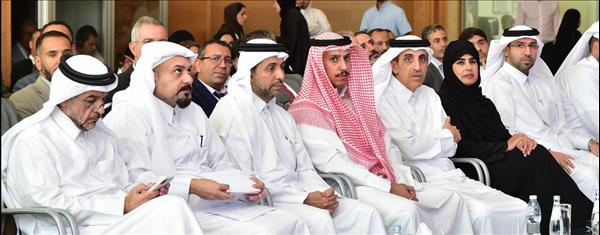
Qatar University Holds Event On GCC Fiscal Policies, Sustainable Development
Doha: Qatar University (QU) College of Business and Economics yesterday kicked off the Second Conference on Fiscal Policies and Sustainable Development in cooperation with the Qatar Financial Centre, University of New South Wales (Australia) and Queensland University of Technology (Australia).
Several economic experts and decision-makers from Qatar and abroad participated in the conference. The conference featured discussion of important economic issues such as the global minimum tax and its impact on the international flow of capital, the global minimum tax and its reflection on tax policy in the Gulf countries, and the problems of tax implementation.
In his speech on the occasion, Dr. Hassan bin Rashid Al Derham, President of QU, said,“We will discuss 'international tax reform and its impact on the Gulf countries' in the second session of the Fiscal Policies and Sustainable Development Conference 2022. This session will discuss the developments that have occurred in the field of international tax reform, which included adopting international standards for enforcing taxes and combating international tax evasion, which will be very important for Qatar and the countries of the region.”
The Gulf Cooperation Council (GCC) countries are endowed with oil and gas, which makes their economies heavily reliant on them as a main source of government revenue. Thus, the fluctuation of oil and gas prices makes GCC economies vulnerable to economic instability. In order to minimise reliance on this sector and to stabilise economies, GCC countries are diversifying their economies away from oil and gas to other sources of revenue.
Economic diversification has been the main strategy of the GCC economic development plans, reflected in developing plans to increase the contribution of the non-hydrocarbon sector, implementing specific programs to spur growth, and grant specific tax and non-tax incentives to encourage private sector and attracting foreign direct investment. These policies focus on financial sector, manufacturing, tourism and hospitality.
The recent development in international taxation led by the OECD with regard to harmful tax competition under Action 5 and the guidelines of global minimum tax under Pillar 2, have raised challenges to the sustainability of granting tax incentives to attract FDI in developing countries in general and GCC countries in particular. This, in turn, increases the pressure on GCC countries to reform their tax policies in order to align with international tax norms and practices.
GCC government initiatives to diversify government revenue has been reflected in a unified Value Added Tax Framework in 2017, which resulted in the introduction of VAT in Saudi Arabia and United Arab Emirates in 2018 and then in Bahrain and Oman. Kuwait and Qatar are planning to introduce VAT in the near future.
This conference aims to achieve the following: (1) discuss the impact of international tax reforms in GCC, (2) propose recommendations on the best practices for tax reform in GCC, and (3) bridge the gap between tax researchers and policy makers in GCC to support tax reform initiatives therein.
Yousuf Mohamed Al Jaida, CEO of the QFC said:“Today, we will listen to interventions from representatives of the Organization for Economic Cooperation and Development (OECD), as the international body responsible for setting international tax rules, government officials, academics at prestigious international universities, and professionals specialised in the field of tax systems locally and globally. Our conference will address the main challenges facing tax authorities and taxpayers when it comes to implementing VAT.
“At the international level, the Qatar Financial Centre and the State of Qatar have always emphasised their support for the existence of advanced international tax systems. I am pleased to say here that Qatar has achieved impressive success in applying all international tax standards, according to the various assessments and reviews conducted under the supervision of the OECD.”

Legal Disclaimer:
MENAFN provides the
information “as is” without warranty of any kind. We do not accept
any responsibility or liability for the accuracy, content, images,
videos, licenses, completeness, legality, or reliability of the information
contained in this article. If you have any complaints or copyright
issues related to this article, kindly contact the provider above.
Most popular stories
Market Research
- Thinkmarkets Adds Synthetic Indices To Its Product Offering
- Ethereum Startup Agoralend Opens Fresh Fundraise After Oversubscribed $300,000 Round.
- KOR Closes Series B Funding To Accelerate Global Growth
- Wise Wolves Corporation Launches Unified Brand To Power The Next Era Of Cross-Border Finance
- Lombard And Story Partner To Revolutionize Creator Economy Via Bitcoin-Backed Infrastructure
- FBS AI Assistant Helps Traders Skip Market Noise And Focus On Strategy




















Comments
No comment